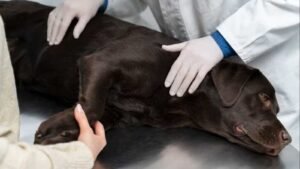Dental illness is a grievous ailment caused by bacteria, plaque, and tartar that accumulate on the teeth and become trapped beneath the gum line.
The bacteria can enter the bloodstream and cause havoc on the body’s other major organs.
It is critical to detect dental disease in your pet as soon as possible. If left untreated, it can lead to chronic pain and inflammation.
The Maxvet recommends dental evaluations as part of your pet’s regular preventive care exam, which should take place at least once a year, to detect dental disease before it negatively affects your pet’s quality of life.
Here are five facts you should be aware of to be an advocate for your pet’s oral (and overall) health;
1) Brush Your Dog’s Teeth
Don’t go too far the first few times. Begin slowly and stop if your dog becomes agitated, even if you don’t brush his entire mouth. You can gradually increase the time as he gets used to it.
2) Regular Dental Cleanings
Despite your best efforts, you won’t be able to give your dog a thorough, deep cleaning with a toothbrush as a vet can. Even if your pet has healthy teeth, it’s a good idea to have your veterinarian perform routine cleanings that include scaling plaque and tartar, cleaning the gum line, and polishing the teeth.
3) Pick the Right Toothpaste for Your Dog
Some pet stores sell dog mouthwash, which can be mixed into water bowls to help kill bacteria and reduce plaque. Doggie mouthwash is safe when used correctly and diluted in your pet’s water; just make sure your pet doesn’t consume the entire bottle. Human mouthwashes, like toothpaste, should not be used on your dog.
4) Dry Food Outperforms Soft Food
If tooth brushing results in blood, sweat, or tears, there are still options for improving your dog’s oral health. Soft food is more likely to stick to your dog’s teeth and cause decay, whereas crunchy kibble is less likely to do so.
5) Chew Bones and Chew Toys for Teeth Cleaning
Giving your dog a good bone to chew on can help get rid of build-up and keep teeth strong, but imagine a human who only chews gum and uses mouth rinse. That’s not an effective means of ensuring good dental hygiene and overall health. The same is true for your dog.
Whether you brush your dog’s teeth or not, you should inspect his mouth once a week or so. Take your dog to the vet if you notice any of the following signs of dental problems:
- Teeth that are broken or loose
- Extra teeth or baby teeth that haven’t fallen out
- Teeth that are discoloured or tartar-covered
- Drooling, chewing, or dropping food from the mouth that is abnormal
- Reduced appetite or food dropping from the mouth
- Pain in or near the mouth
- Bleeding in the mouth
- Swelling in the mouth and surrounding areas
- Bad breath
- Yellow Teeth
You may be concerned about whether it will benefit your pet. The best thing you can do is talk to your veterinarian about your options. Please do not hesitate to contact us if you have any questions.


